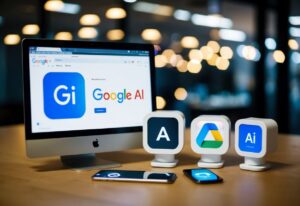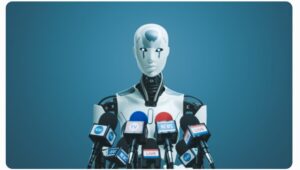“Why” questions people frequently ask about AI
30 top “why” questions people frequently ask about AI and their answers.
As I delve into the fascinating realm of Artificial Intelligence (AI), I often encounter a myriad of questions—especially those beginning with “how.” These inquiries reflect our natural curiosity about this groundbreaking technology and its growing presence in our daily lives.
How does AI learn? How is it being used in different industries? How can we ensure it remains ethical and safe? In this article, I will address some of the most Frequently asked Why questions about AI. By providing clear and informative answers, I hope to demystify AI and offer insights into how it works, its applications, and its implications for our future.
1. Why is AI important?
Answer: AI is important because it has the potential to drastically improve efficiency, solve complex problems, and revolutionize various industries. In healthcare, AI aids in diagnosing diseases, predicting patient outcomes, and creating personalized treatment plans. In finance, it helps detect fraudulent transactions, streamline customer service with chatbots, and enhance trading strategies. In education, AI can tailor learning experiences to each student’s pace and style. Overall, AI’s ability to analyze vast amounts of data and generate actionable insights makes it a powerful tool for tackling challenges that require speed, precision, and scalability.
2. Why is AI taking over jobs?
Answer: AI is automating repetitive, rule-based tasks across many industries. This leads to the replacement of certain jobs, particularly those involving data processing, customer support, or manufacturing. For instance, robots and AI-driven systems handle many assembly line tasks, reducing the need for human labor. In customer service, AI chatbots can handle simple inquiries 24/7. While AI may displace some jobs, it also creates roles focused on developing and overseeing AI systems. The impact of AI on employment will depend on how industries integrate AI with human roles, underscoring the need for retraining and skill development for affected workers.
Frequently asked Why questions about AI3. Why is AI controversial?
Answer: AI is controversial due to ethical, social, and privacy concerns. Ethically, AI can sometimes make biased decisions due to its training data, leading to unfair outcomes. Socially, there are concerns that AI may widen the gap between those with access to AI technologies and those without. Privacy is another major issue, as AI often requires large datasets, which can include sensitive personal information, raising concerns over data misuse or unauthorized surveillance. Additionally, debates about AI’s long-term impact on human autonomy persist, especially in areas like criminal justice or healthcare.
4. Why is AI difficult to develop?
Answer: Developing AI is challenging due to the complexity of replicating human reasoning, perception, and decision-making. Creating general intelligence is especially difficult as it requires advancements in neuroscience, cognitive psychology, and computational power. Developing AI that understands context or emotions is challenging because these skills are subjective and hard to program. Additionally, AI depends on high-quality data, and obtaining such data while maintaining ethical standards can be costly and time-consuming.
5. Why does AI need so much data?
Answer: AI, particularly machine learning and deep learning models, relies on large datasets to learn patterns and make accurate predictions. When trained on vast data, an AI model can identify subtle correlations and improve its accuracy. For example, in image recognition, AI requires thousands of labeled images to correctly recognize objects. Deep learning models learn by adjusting millions of parameters, which requires substantial data for effective generalization and to avoid overfitting.
6. Why does AI matter in healthcare?
Answer: AI has transformative potential in healthcare, enhancing diagnostics, treatment planning, and patient care. For instance, AI algorithms can analyze medical images more quickly and sometimes more accurately than human radiologists, enabling faster diagnoses. AI can also predict patient outcomes and help create personalized treatment plans based on a patient’s profile. AI-powered virtual assistants make healthcare more accessible by answering patient queries and assisting with remote monitoring for chronic conditions.
7. Why is AI often biased?
Answer: Bias in AI typically arises from the data used to train AI systems, which can reflect societal inequalities. For example, a facial recognition model trained mostly on light-skinned individuals may perform poorly on darker-skinned individuals. AI can also inherit biases from the humans who design these systems. Reducing bias requires diverse datasets, implementing fairness algorithms, and conducting thorough audits to ensure AI systems are equitable.
8. Why is AI growing so fast?
Answer: The rapid growth of AI is due to advances in computing power, availability of large datasets, and breakthroughs in algorithms like deep learning. GPUs and TPUs enable faster data processing, making it feasible to train complex models. Digital sources like social media, sensors, and online transactions provide rich data for AI training. Innovations in machine learning and neural network architectures, like transformers, have improved AI’s capabilities in tasks like language processing and predictive analytics.
Frequently asked Why questions about AI9. Why do we need ethical guidelines for AI?
Answer: Ethical guidelines in AI are essential to prevent misuse, ensure fairness, and protect individual rights. Without standards, AI could be used for harmful purposes, like biased hiring, manipulative advertising, or invasive surveillance. Guidelines help regulate AI usage, covering data privacy, accountability, and transparency in AI decision-making. Building a comprehensive ethical framework promotes public trust and enables AI to be used positively, benefiting society as a whole.
10. Why are humans essential in AI development?
Answer: Humans play a crucial role in AI development by providing the necessary context, creativity, and ethical considerations that AI lacks. Humans curate and annotate the training data, ensuring it is relevant and representative. Moreover, human oversight is essential in interpreting AI outputs and making decisions based on those outputs. Furthermore, interdisciplinary collaboration involving fields like psychology, sociology, and ethics ensures that AI systems align with human values and societal needs.
11. Why is AI important for the future of education?
Answer: AI is important for the future of education because it enables personalized learning, allowing educational content to adapt to individual students’ needs, learning styles, and paces. This approach fosters a more engaging and effective learning experience, ensuring that students can grasp concepts thoroughly before progressing. Additionally, AI can assist in identifying learning gaps and providing targeted resources, thereby enhancing overall educational outcomes.
12. Why is AI significant in the fight against climate change?
Answer: AI plays a significant role in the fight against climate change by optimizing energy usage across various sectors, such as transportation and manufacturing. AI algorithms analyze climate data to identify trends, predict environmental impacts, and develop strategies for sustainability. Moreover, AI helps in the design of renewable energy systems, improving efficiency and effectiveness in harnessing energy sources like solar and wind.
13. Why is it challenging to make AI unbiased?
Answer: Making AI unbiased is challenging due to the need to address historical biases that exist in the data used for training AI models. These biases can stem from societal inequalities and reflect prejudices present in the real world. Ensuring fair data representation requires meticulous attention to the selection and curation of training datasets, as well as ongoing evaluation of AI outputs to identify and mitigate any emergent biases.
14. Why do AI systems sometimes make errors or biased decisions?
Answer: AI systems can make errors or biased decisions due to data limitations, such as insufficient or non-representative training data. Additionally, flaws in the training process or inherent weaknesses in the algorithms used can lead to inaccurate outcomes. These factors contribute to the complexities of AI decision-making and underscore the importance of robust testing and validation.
15. Why is AI often used in healthcare?
Answer: AI is frequently used in healthcare due to its ability to excel at image analysis, such as interpreting medical scans, and in predictive diagnostics, which helps identify potential health risks before they become critical. AI provides vital support in areas like personalized medicine and patient monitoring, ultimately enhancing patient outcomes and optimizing healthcare delivery.
16. Why does AI require large amounts of data?
Answer: AI requires large amounts of data because having ample data allows for better model training, enabling AI systems to learn from diverse examples and reduce errors in predictions. When AI models are trained on extensive datasets, they can recognize complex patterns and make more accurate inferences, improving their effectiveness across various applications, including natural language processing and computer vision.
17. Why are people concerned about AI surveillance?
Answer: Concerns about AI surveillance arise from the potential for privacy violations and the misuse of data collected by AI-powered tools. Surveillance systems that employ AI can lead to invasive monitoring, raising ethical questions about consent and the extent of government or corporate oversight. This situation emphasizes the need for clear regulations regarding the use of AI in surveillance to protect individual rights.
18. Why is AI advancing faster now than in previous decades?
Answer: The rapid advancement of AI compared to previous decades can be attributed to improvements in hardware, increased availability of big data, and breakthroughs in algorithms, particularly in deep learning. These factors enable more powerful computing capabilities and the ability to process and analyze vast datasets, driving innovation in AI applications across various fields, including finance and healthcare.
19. Why do some AI applications struggle with ethical issues?
Answer: Some AI applications struggle with ethical issues due to complexities in areas like fairness, where AI systems may inadvertently perpetuate biases, and decision-making, which raises questions about accountability. The deployment of AI in sensitive domains such as criminal justice and healthcare necessitates careful consideration of ethical implications, ensuring that AI systems align with societal values and standards.
20. Why is understanding AI critical for modern businesses?
Answer: Understanding AI is critical for modern businesses because it provides data insights that inform decision-making and strategies. AI enables customer personalization, which enhances user experiences and drives loyalty. Moreover, businesses leveraging AI can gain a competitive advantage by optimizing operations, improving efficiency, and identifying emerging market trends, ultimately leading to better financial performance.
21. Why is AI considered a powerful tool for climate change mitigation?
Answer: AI is considered a powerful tool for climate change mitigation because it enhances climate prediction models, allowing for better forecasting of environmental changes and extreme weather events. Additionally, AI optimizes energy consumption across various sectors, such as transportation and manufacturing, promoting sustainability by reducing waste and emissions. By analyzing vast amounts of data, AI helps identify patterns and solutions that can significantly contribute to environmental sustainability.
22. Why are there concerns about AI’s role in surveillance?
Answer: There are concerns about AI’s role in surveillance due to its potential for privacy invasions and the misuse of collected data. AI-powered surveillance systems can track individuals without consent, raising ethical questions about the extent of monitoring and the implications for civil liberties. In certain contexts, such as law enforcement and public safety, the misuse of surveillance technologies can lead to discriminatory practices, emphasizing the need for careful regulation and oversight.
23. Why is there a push for ethical guidelines in AI development?
Answer: There is a push for ethical guidelines in AI development to ensure that AI systems are developed responsibly and do not perpetuate existing biases or inequalities. Guidelines help prevent discrimination by establishing standards for fairness, accountability, and transparency in AI applications. These ethical frameworks are essential for fostering public trust and promoting the responsible use of AI in sensitive areas such as healthcare, criminal justice, and employment.
24. Why does AI sometimes exhibit bias, and how can it be reduced?
Answer: AI sometimes exhibits bias due to the data limitations present in training datasets, which may reflect historical prejudices or societal inequalities. To reduce bias, it is crucial to use diverse datasets that represent a wide range of perspectives and demographics. Additionally, conducting regular audits of AI systems helps identify and mitigate biases in real-time, ensuring more equitable outcomes in applications like hiring and lending.
25. Why do experts debate the role of AI in enhancing or limiting creativity?
Answer: Experts debate the role of AI in creativity because while AI can inspire new ideas and streamline creative processes, it may also limit human originality. Some argue that reliance on AI tools in creative fields—such as art, music, and writing—could lead to homogenization of creative outputs. This discussion raises important questions about the nature of creativity and the balance between human input and machine assistance.
26. Why is AI significant in the evolution of robotics?
Answer: AI is significant in the evolution of robotics because it enables the development of adaptive robots that can perform complex tasks autonomously. AI allows robots to learn from their environments, make decisions, and adapt to changing conditions, enhancing their capabilities in various industries, including manufacturing, healthcare, and agriculture. This integration of AI into robotics is transforming how tasks are executed and increasing efficiency.
27. Why is data privacy a major concern in AI applications?
Answer: Data privacy is a major concern in AI applications due to the technology’s heavy reliance on personal data for training and operation. The collection and analysis of sensitive information can lead to privacy violations if not handled responsibly. In applications such as healthcare and financial services, ensuring the protection of personal data is critical to maintaining user trust and compliance with regulations like GDPR.
28. Why are governments implementing regulations for AI usage?
Answer: Governments are implementing regulations for AI usage to protect citizen rights, ensure transparency in AI processes, and prevent harm caused by poorly designed systems. Regulations help establish standards for accountability and ethical behavior in AI development, addressing concerns such as discrimination, privacy, and surveillance. As AI becomes more integrated into society, clear guidelines are essential for balancing innovation with public safety.
29. Why might AI change the nature of human interaction?
Answer: AI might change the nature of human interaction through the introduction of tools like customer service bots and virtual assistants, which can alter how individuals communicate and seek assistance. These tools can enhance efficiency and accessibility but may also diminish face-to-face interactions and the nuances of human communication. The evolving role of AI in social dynamics raises questions about the quality of relationships and the future of interpersonal communication.
30. Why is there a need for transparency in AI algorithms?
Answer: Transparency in AI algorithms is necessary to build user trust and promote accountability in critical applications, such as finance and healthcare. When users understand how AI systems make decisions, they can better assess their reliability and fairness. Transparency also facilitates compliance with regulatory standards and enables stakeholders to hold organizations accountable for their AI practices, ensuring that technology serves the public good.
Conclusion
In wrapping up our exploration of the most common “how” questions about AI, I feel a renewed appreciation for the complexities and wonders of this technology.
Understanding how AI operates—its learning processes, applications across various sectors, and the safeguards we can implement—empowers us to engage more meaningfully with its advancements.
While AI presents challenges that require careful consideration, such as ethical implications and potential biases, it also holds tremendous promise for enhancing our lives and solving pressing global issues.
As we move forward, let us remain inquisitive and informed, continually seeking to understand how we can harness AI’s potential while addressing its challenges head-on. By fostering a culture of knowledge and dialogue, we can navigate the future of AI with confidence and optimism.



















